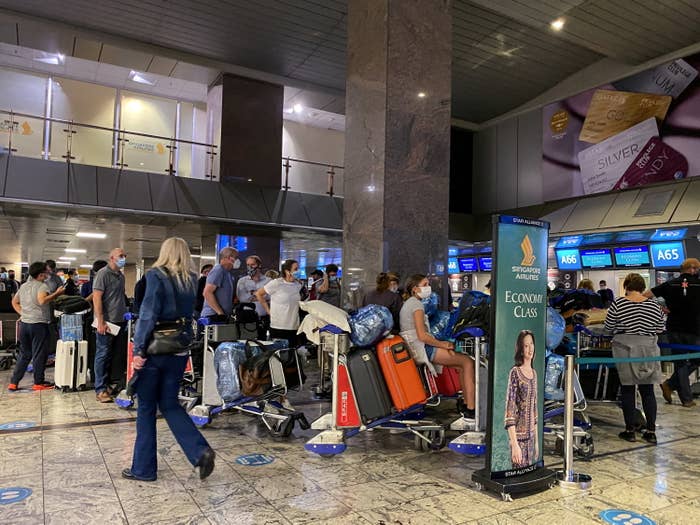
Not much is known about the COVID-19 Omicron variant, and scientists around the world are still learning more about its potential impact, the World Health Organization said Sunday, noting that preliminary evidence suggested there may be an increased risk of reinfection among people who previously had COVID-19 compared with other variants of concern.
But even then, the WHO said, “information is limited. More information on this will become available in the coming days and weeks.”
It's not yet clear whether Omicron is more transmissible or whether it causes more severe disease than other variants do, the WHO said in the statement. “There is currently no information to suggest that symptoms associated with Omicron are different from those from other variants,” the organization added.
The WHO also said that it was working with its partners to understand how current vaccines protect against Omicron.
Getting vaccinated is still the best way to defend against COVID-19. “Vaccines remain critical to reducing severe disease and death, including against the dominant circulating virus, Delta. Current vaccines remain effective against severe disease and death,” the WHO said.
What is clear is that Omicron has a relatively large number of mutations in its spike protein — the part that attaches the virus to healthy cells — which in part led the WHO to designate it a “variant of concern.” The WHO’s announcement, which came during the travel-heavy holiday season toward the end of the year, triggered travel restrictions around the world and brought fresh criticism that richer countries are hoarding vaccinations.
The variant was first identified in South Africa, causing the US and several other countries, including the UK, Italy, France, Japan, Thailand, Singapore, Morocco, Israel, and the Netherlands, to restrict travel from the region. Some public health experts said travel restrictions could discourage other nations from reporting future variants in an effort to avoid such constraints, and doubted that it would have much of an impact on the spread.
PCR tests detect Omicron, the WHO said, but “studies are ongoing to determine whether there is any impact on other types of tests, including rapid antigen detection tests.” It’s unclear, the organization said, whether an increase in cases in South Africa was a specific result of Omicron or involved other factors.
The Netherlands on Sunday confirmed at least 13 cases of people infected with the Omicron variant among 61 passengers who tested positive for the coronavirus after flying into the country from South Africa.
Paul Burton, Moderna's chief medical officer, told the BBC's Andrew Marr on Sunday that the company was working on developing a booster shot against the Omicron variant that could be available as soon as early 2022.
"We should know about the ability of the current vaccine to provide protection in the next couple of weeks, but the remarkable thing about the mRNA vaccines, Moderna platform is that we can move very fast," Burton said on The Andrew Marr Show.
"If we have to make a brand-new vaccine, I think that’s going to be early 2022 before that’s really going to be available in large quantities."
Francis Collins, director of the National Institutes of Health, told CNN’s State of the Union that the Omicron variant should "redouble" the nation's efforts to vaccinate people and give those who are eligible boosters.
"The booster, it basically enlarges the capacity of your immune system to recognize all kinds of different spike proteins it's never seen," Collins said.
And Anthony Fauci, director of the National Institute of Allergy and Infectious Diseases, said on Meet the Press that the Omicron variant had about 32 or more variants in the spike protein of the virus and another 10 or more mutations on the receptor binding domain.
These mutations could give the Omicron variant an advantage over methods of stopping new infections, such as vaccines or antibodies from a previous infection, Fauci said.
"The profile of the mutations strongly suggest that it's going to have an advantage in transmissibility and that it might evade immune protection," Fauci said. "It's not necessarily that that's going to happen, but it's a strong indication that we really need to be prepared for."
At a Saturday night press conference, UK Prime Minister Boris Johnson said the health ministry would require — for anyone who enters the country or anyone who comes in contact with someone with a suspected positive Omicron infection — PCR tests and self-isolation. In addition, everyone will need to wear face coverings in shops and public transportation.
The variant immediately raised questions about how, and whether, people should travel during the current holiday season.
"People should continue with their plans as normal for Christmas. I think it's going to be a great Christmas,” Sajid Javid, the UK’s health minister, told Sky News.
Scott Gottlieb, the former FDA commissioner, said on Face the Nation that it was "almost a certainty" that the Omicron variant was already in the US, considering how many planes have landed in the country over the Thanksgiving holiday. But Collins, of the NIH, said on State of the Union that there was no evidence the Omicron variant was already in the US.
